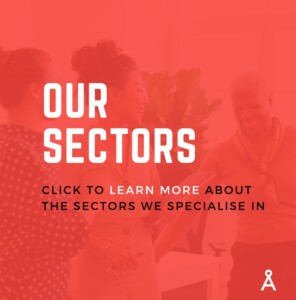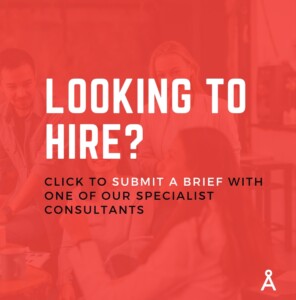We seem to all be certainly operating differently in these uncertain times.
But the key point that we all felt strongly about: We want to help people!
With this in mind, here are some lives tips, predictions, advice and trend spotting to make your life easier when you’re looking for a new job during the Covid-19 crisis.
What’s the best bit of advice you’ve given a candidate over this covid-19 period?
Sagar:
“Don’t panic. Use this time to reflect on what it is that is important for you in your next role, understand your priorities. Identify your key strengths and areas of expertise and align your job search with that. Take this time to revamp your CV, LinkedIn profile and use your network to open conversations – you never know when opportunity will knock, so be ready!”
Rhys:
“The marketing is changing every day and we’re finding that new jobs are still coming up especially within Supply Chain, so make sure your CV / LinkedIn is updated to the best it can be and try to be as active as you can with them! Be patient with applications as recruitment will a take a little longer than usual but stay positive as there are still a lot of companies recruiting!”
Andy:
“Think about how you can pivot and use the skills you have in a different area/context – people often default to searching for the job they’ve done before but now more than ever, that job might not exist. There are opportunities all over the place, but you may have to rethink how and where you use your skillset.”
Tom:
“Be proactive, stay positive and remember it will go back to normal at some point – in the meantime, connect to and reach out to as many people as possible so you’ll be at the forefront of their minds when things pop up.”
David:
“Take a wide-ranging approach – nail your Linkedin profile, monitor all job boards/agency websites daily, have your CV on databases, make direct approaches – you’ll get ignored or ghosted loads, it’s not personal but keep at it. In this climate, job searching is a 9 – 5 job in itself – treat it that way.”
Alex:
“Stay positive, the market isn’t completely dead and companies are still recruiting and finding ways to on-board people remotely. Keep applying and take the extra time on your hand to really prepare before an interview.”
What’s the best bit of advice you’ve given a client over this covid-19 period?
Sagar:
“Take a step back and have a look at your team and operation. How has it reacted to the current climate, where were the chinks in the armour, where are the strengths. Use this to think about a strategy to future-proof your team. Understand that the workplace will most likely look very different with employers seeing first-hand that remote working works! If you do need to hire in the current climate, make sure you have a plan for onboarding, training and new starter engagement – this is crucial to ensure your new joiner feels confident with their choice.”
Rhys:
“If you’re recruiting and hiring remotely, try and include team members within interviews. This will allow the candidates to meet who they will be potentially working closely with and get a better feel for the culture/how the business operates. Also, as we are in lockdown for a while now sharing videos/photos of the office environment is a good idea for the candidates to see what it is really like.”
Andy:
“If you are comfortable hiring and onboarding remotely then don’t put a process on hold – you’re in a less competitive market for talent and through no fault of their own there are some brilliant people available.”
David:
“Plot out their average hiring process in terms of timeline and then work out likely scenarios for returning to the office & the pros and cons of remotely onboarding if they had to vs. the requirement to hire. This gave them 2 or 3 clear paths they could down to make the most important hires they have in this next 3 month period.”
Alex:
“Even if you are pausing recruitment, still meet with potential candidates for roles you think you will be needing when things come back to normal.”
What trend have you seen in your industry over this covid-19 period?
Sagar:
“After the initial panic, it’s been amazing to see how Supply Chain teams have stepped up to keep businesses moving. The Supply Chain is no longer seen as a cost-cutter” more so the foundation of a business. Teams have gone above and beyond to change sourcing strategies, maximise their supplier relationships and forecast as accurately as possible to maintain control.”
Rhys:
“Supply Chain teams within the food industry has definitely been under a lot of strain, due to panic / overbuying in supermarkets. A lot of candidates who I have spoken to have had a really full-on experience and have been working extremely hard. However, things are slowly getting back to the norm for those Supply Chain teams and are adjusting to the WFH life. One candidate told me that it was like the Christmas period but only have two hours to plan for it instead of 11 months.”
Andy:
“Agencies picking up the slack when it comes to eCommerce – brands leaning on service providers to help them through the increase in online sales.”
David:
“This has evolved – Panic and fear of the unknown initially, quickly followed by unbreakable resolve & incredibly hard work and now its structured planning and common sense prevailing.”
Alex:
“People are more available to speak on the phone and actually welcome speaking to someone they don’t know. It feels easier to build relationships with clients and candidates.
I saw a lot of PR candidates who have been made redundant uniting to help small business struggling with their coms. It’s all pro-bono work but they love their job so much that they are happy to work without being paid. All that remotely!”
What good has come out of this massive shift in the market?
Siobhan:
“Some employers have done great things – RB giving away their advertising space, Molson Coors giving vulnerable staff full pay pre government advice. Employers who traditionally have been office-based are talking about relaxing the rules around this once we get back to ‘normal’ as they have realised people are efficient and it helps work-life balance.”
Sagar:
“Aside from the many questionable haircuts, the destruction of friendships over cheating quiz masters, people becoming online poker pros and all the fake 5k times?
People working from home have proven that the workforce can be trusted and productive. My hope is that businesses acknowledge this and become more accepting of flexibility. Trust goes a long way
Speaking from personal experience, working from home has brought colleagues closer and I for one have a real appreciation for the awesome people I work with – I’m sure many others will have the same feeling.”
Rhys:
“Personally, it’s great to see how quickly people adapt to this crazy situation and continue to work hard! Also, for those companies who aren’t flexible on WFH or strict core work times this will be a great eye-opener and could potentially see more businesses being open to this.”
Andy:
“People questioning ‘the way things have always been done’. There are still a surprising number of businesses who are reluctant to let people work from home and this will accelerate change in that respect, but I would hope that mindset will also infiltrate into other areas (a big bugbear of mine is unnecessary meetings…..). I would hope also a realisation that so much travel is either unnecessary or luxury so we all do a bit less (flying in particular) but the cynic in me thinks that might not last long…… Other things – the Eminem bleach blonde look suits me to a tee (I can hear my colleagues chuckling), the level of quizzing ability across the world has increased substantially, people are great, I’m a bit better at guitar, bread machines are going to be really cheap on eBay later in the year.”
Tom:
“Not recruitment related but it’s restored my faith in humanity. People have nothing better to do but exercise and fast food restaurants are closed, should lead to healthier lifestyles and less of a strain on national services albeit tiny. I’m not a tree hugger but the planet seems to be recovering slightly from the break. It’s acceptable to play Xbox for 12 hours a day on weekends when you’re not under the age of 16. Finally, I’ve never realised how much time I have without having to commute.”
David:
“Loads of stuff:
1) People care more
2) Know their colleagues better not worse
3) Video calls are normal
4) So are terrible haircuts (which levels the playing field for me)
5) Working from home will be more accepted by leadership – people don’t just watch Netflix when they work from home, they actually double down to prove they can get sh*t done
6) World leaders will plan far better for pandemics in the future just as they have shown a fair better response to economically as a result of learnings from the Global Financial Crisis (2008-09)
7) You see peoples true colours at all levels – Captain Tom, Mike Ashley, Floyd the Cat (VA sudo mascot), family, friends and most importantly those in the health services / on the front line across the world.”
Alex:
“My faith in humanity has been restored a bit, seeing people being so happy to help a stranger or a neighbour is nice and refreshing. Seeing how people get a lot more creative when they can’t go to the pub and drink!
Market wise, I can see that people who were commuting every day to work are now thinking that WFH is actually the way to go. We also see clients being more flexible and offering remote working after lockdown. This will allow great talent to join their dream employer without needing to relocate to some random suburb!
It has also been very refreshing to see how people adapt really quickly to the new normal, which should show to employers that everything is possible if you really want it. They may now stop hiring like for like and start giving the wild card in the stack of applications a chance to thrive!”
What’s your prediction for the market in August 2020?
Sagar:
“How long is a piece of string? (depends what length you bought, I know). My honest opinion is that once there’s more clarity on timelines and the doors open again, there’ll be a period of change. Businesses and staff will need to take the time to bring things back to a level of normality which could take time. For some industries, however (eg. pharmaceutical, FMCG, personal care) who have seen a surge in demand, I imagine there will be a drive o grow and invest in their Supply Chains.”
Rhys:
“Would love to be able to believe that everything would be back to normal by August, but I think will take a little longer for the market to be back to where it was before covid-19. I can imagine lockdown will be lifted and people will be back in the office and be adapting to new ways of working. Hiring will be different, and I do think more roles will be coming in more frequently in August, as this is usually a quieter time due to the holidays. I think the winter months of this year will hopefully be where the market really picks up again!”
Andy:
“I’ve become increasingly irritated with recruiters talking about ‘the market’ and ending up talking about ‘the economy’, which generally they know nothing about. So I will refrain from making any wild statements other than about the areas I recruit within – eCommerce is on the agenda of senior leaders in a way it has never been, so I could actually envisage a relatively buoyant market and budget that people have previously denied for hiring now being granted. August is usually quiet given summer holidays, but I can see that not being the case whatsoever this year.”
Tom:
“I’m guessing that by the time August comes round we’d have lifted all lockdown restrictions. Meaning the demands for industries will come back (on-trade, travel, events) and even though some businesses may not make it through this period, there’ll be a need to hire into those industries. Wishful thinking but I’m hoping a big boom, we hit our targets, go skiing and have it off.”
David:
“Bloody hell Bella (Senior Marketing Exec) … Let me check my crystal ball…August is usually the quietest month of the year due to holidays from a hiring perspective so it’s very tricky to know in reality where August will end up BUT I would say that September – December should see a real change in dynamic for the recruitment market. Internal hiring teams will have lower headcount, recruitment will have lower headcounts and there will be increased demand so those who get it right will find great opportunities for growth towards the end of this year;
As much as I hope the market will come back to exactly where it was before all this mess, I highly doubt August will be massively different. It will take time for most companies and agencies to get back to where they were before. Most of them will resume recruitment fairly quickly but a lot will also be struggling and will need to potentially scale back. Only time can tell though.”
Siobhan:
“I think for a lot of candidates, their career motivators will drastically change. We have spent more and more time with families/ friends than ever before and it will be a real shock to the system to start spending 2 hours a day commuting and missing out on ‘dinner time /bath time/gym time’ and having to go back to how busy life was before lockdown. This has given people the time to stop and think and take work-life balance to a new level – I think work/life balance will be far higher on people’s motivators to change careers now we have seen what life can be like.”
What creative ideas have you seen employers doing during this time?
Sagar:
“I’ve seen candidates and clients, as well as colleagues, make a conscious effort to connect their networks, offering help and exposure to those whose careers have been impacted by COVID 19.
The countless, quizzes, team nights out (inside) and cook-offs have been great morale boosters. Most creative has to be VA’s MTV Cribs idea, this is yet to be topped by any business I’ve spoken to so far!”
Rhys:
“Due to the office environment been missed a lot of people its’ been great to see fun ideas such as the virtual pub’s visits/quizzes to boost morale and also, seen a few book clubs and virtual gym sessions to keep everyone sane! Also, receiving great feedback from new starters during the lockdown and where they are meeting people within the business through video calls and virtual coffees was really nice to hear.”
Andy:
“I’ve really enjoyed seeing the formation of new ‘collectives’ of people who have been furloughed or made redundant coming together to create new agencies (https://www.notfurlongcreative.co.uk/). My sister is a teacher and their department have each set a task every day which has been very entertaining – recreate a famous scene from a film, how many things can you fit in a matchbox, make your own meme etc. The Vertical Advantage / Nurture ‘MTV Cribs’ was pretty good, but will remain within this parish…”
Tom:
“Drinks on a Friday whilst on a video call is very common for my candidates and clients including Fever-Tree and AV. A business Analyst at Asahi has spent her weekends delivering pints from unsold kegs. LG have done CSR programmes where colleagues do an activity for Charity. I’m yet to see MTV Cribs.”
David:
“Could be for team morale, hiring, onboarding etc.
I think Andy Davies and our Digital / E-Commerce team have been very good with sharing their ‘Available Candidate’ spreadsheet not only online but then also forwarding it to companies that they see are hiring (all for free / with no recompense if those candidates are hired) – people might look at the spreadsheet cynically but they don’t see the work behind the scenes, in terms of how that team, in particular, is genuinely helping during this time”
Alex:
“I have seen some of my clients organising wellness lunches and breakfast roulette to keep their team connected and sane! I have seen them sharing lists of things they would recommend their friends, family, colleagues to do while on lockdown, whether it’s movies or TV shows, arts and crafts, DIY, sports or meditation.
I don’t think a lot of them are still keeping their night out in the diary though! That’s a VA only thing!”
































Recent Comments